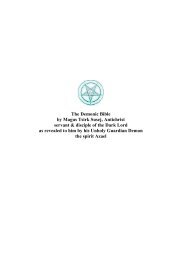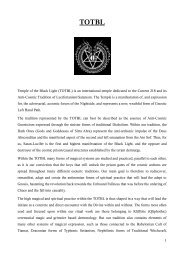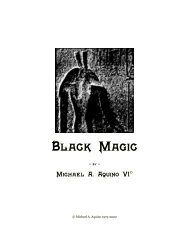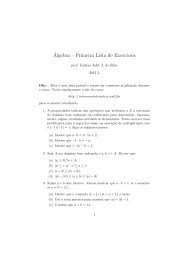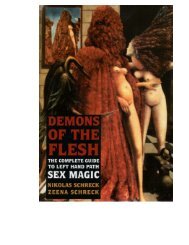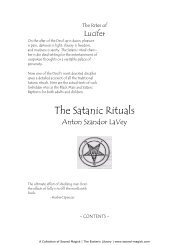Satanism Today - An Encyclopedia of Religion, Folklore and Popular ...
Satanism Today - An Encyclopedia of Religion, Folklore and Popular ...
Satanism Today - An Encyclopedia of Religion, Folklore and Popular ...
Create successful ePaper yourself
Turn your PDF publications into a flip-book with our unique Google optimized e-Paper software.
140 Judgment <strong>of</strong> the Dead<br />
soul is judged by Osiris (the judge <strong>of</strong> the underworld),<br />
who weights on a balance the heart <strong>of</strong> the<br />
dead person against a feather to determine<br />
whether the dead deserves eternal beatitude. Souls<br />
who do not measure up will be consumed by the<br />
devourer <strong>of</strong> the dead.<br />
In the ancient Vedic texts <strong>of</strong> India, a distinction<br />
was made by the underworld judge, King Yama,<br />
between liars <strong>and</strong> those who had been sincere. A<br />
weighing <strong>of</strong> good <strong>and</strong> evil is also mentioned in<br />
later Brahmanic texts. In Chinese Mahayana<br />
Buddhism, the judge <strong>of</strong> the dead (Yen-lo Wang),<br />
along with other divinities <strong>of</strong> Chinese origin,<br />
determine the fate <strong>of</strong> the dead. In Japanese<br />
Buddhism one also finds a judge <strong>of</strong> the dead,<br />
known as Enma. In Chinese Taoism a judgment <strong>of</strong><br />
the dead occurs in which the soul is assigned to<br />
one <strong>of</strong> many hells or paradises found on the<br />
Chinese mythological l<strong>and</strong>scape.<br />
In the ancient Greek world Hades was an<br />
underworld kingdom that hosted the shadows <strong>of</strong><br />
the dead while the Elysian Fields were accessible<br />
only to the righteous. In the Homeric poems<br />
Minos is mentioned as a regulator rather than<br />
properly a judge <strong>of</strong> the dead. With the development<br />
<strong>of</strong> Pythagorean doctrine, a true afterlife<br />
judgment was conceived in Pythagoras’s notion <strong>of</strong><br />
reincarnation. Orphism introduced the afterlife<br />
judgment <strong>of</strong> Rhadamantos, Triptolemos, <strong>and</strong><br />
Aiakos in its mythological system. Plato mentions<br />
the judgment <strong>of</strong> the dead by these three figures at<br />
the conclusion <strong>of</strong> Gorgias. In ancient Roman literature<br />
one finds judges <strong>of</strong> the dead who originated<br />
in Greece, Rhadamanthos, <strong>and</strong> Minos.<br />
In early Judaism the deeds <strong>of</strong> the dead were<br />
recorded <strong>and</strong> a judgment <strong>of</strong> the dead mentioned<br />
to establish punishment for the sinners or reward<br />
for the righteous (culminating in resurrection). In<br />
Christianity the judgment <strong>of</strong> the soul is believed to<br />
occur upon the death <strong>of</strong> the individual, who will<br />
be assigned either eternal condemnation or<br />
reward (hell or heaven) or, in some Christian<br />
churches, purgatory. Some texts also mention a<br />
final judgment day, held at the end <strong>of</strong> time by God<br />
or by the Son, Jesus Christ, which will culminate in<br />
the resurrection <strong>of</strong> the righteous <strong>and</strong> eternal<br />
damnation for sinners. In Islam a notion <strong>of</strong> an<br />
imminent judgment day draws primarily from<br />
Jewish literature; in the Koran a description <strong>of</strong> a<br />
trial <strong>of</strong> the soul refers to a scale weighing good <strong>and</strong><br />
evil deeds, <strong>and</strong> consequently to eternal reward<br />
(paradise) or penalty (hell).<br />
See also Judaism; Zoroastrianism<br />
For Further Reading:<br />
Eliade, Mircea, ed. <strong>Encyclopedia</strong> <strong>of</strong> <strong>Religion</strong>. New<br />
York: Macmillan, 1987.<br />
MacGregor, Geddes. Images <strong>of</strong> Afterlife: Beliefs from<br />
<strong>An</strong>tiquity to Modern Times. New York: Paragon<br />
House, 1992.<br />
Van Der Leeuw, G. <strong>Religion</strong> in Essence <strong>and</strong><br />
Manifestation. Vol. 1. 1933. Gloucester, MA:<br />
Peter Smith, 1967.




